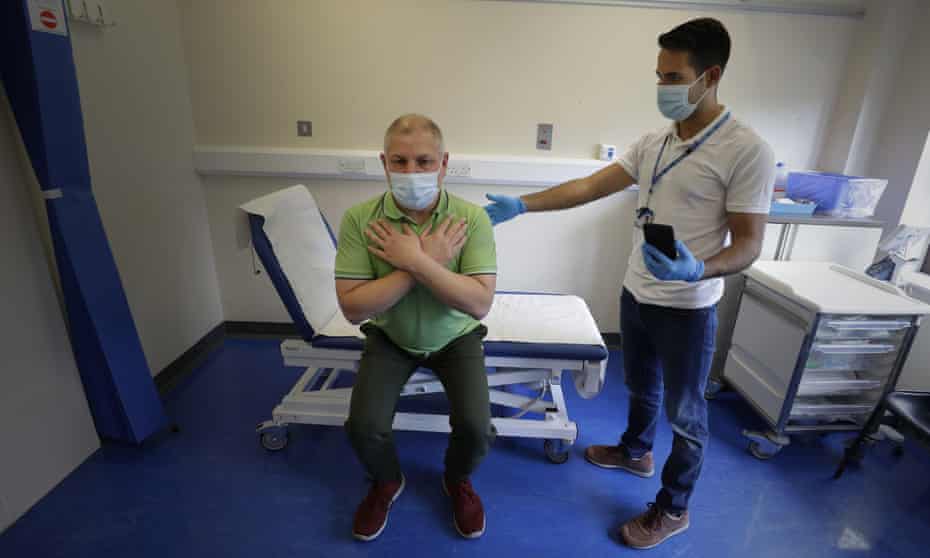I’m leading a long Covid trial – it’s clear Britain has underestimated its impact

D
The World Health Organization defines long Covid as ongoing symptoms “three months from the onset of Covid-19”. In December, the Office for National Statistics (ONS) estimated that more than 1.3 million people in the UK had symptoms for four weeks or more after Covid-19, of whom 892,000 people (70%) had symptoms that persisted for at least 12 weeks, and 506,000 (40%) for at least one year. Dr Melissa Heightman, who leads the University College London hospital specialist long Covid clinic says that breathlessness, fatigue, cough, myalgia, chest pain, headache, “brain fog” and palpitations are most commonly reported. But many other symptoms may be present.
Despite this evidence, long Covid has been absent from government Covid-19 briefings over the course of the pandemic. This is a major failure, and shows the difficulty both medics and policymakers often have in identifying and dealing with chronic conditions. Throughout the pandemic, our reports, media, funding and research have concentrated on acute effects such as infections, hospitalisations and deaths, not chronic ones, such as cases and referrals for long Covid.
Because of this we may not even know the scale of the problem. The ONS estimates for long Covid are based on an ongoing survey and may not be representative of the whole population. Although major research studies have been funded by the National Institute for Health Research, national and international long Covid surveillance is lacking. In each successive wave, we have sought short-term fixes for Covid-19 and long Covid. Reasons for this include short news and political cycles, chronic underfunding and under-prioritisation of prevention – all longstanding issues in UK health policy.
Prevailing ways of thinking in science, healthcare and policy haven’t necessarily helped, either. For example, an outdated classification distinguishes diseases as “organic” or “functional”. Organic conditions, such as heart attacks, rheumatoid arthritis and bowel cancer are those that cause changes detectable by investigations such as blood tests or scans.
Functional conditions, such as irritable bowel syndrome and chronic fatigue syndrome, do not necessarily cause changes detectable by tests, or the right test may not yet be available. Stigma and misconceptions arising from this classification may lead to functional conditions being overlooked, which is surely familiar to many with long Covid.
Monitoring and prevention of mortality – death – has always been prioritised above morbidity – the general suffering caused by disease. But there have been attempts to change this. A measurement called “disability-adjusted life years” (DALYs), conceived in 1990, attempts to capture the impact of diseases on people’s lives, and led to the Global Burden of Disease Study, comparing morbidity and mortality across diseases and countries. The methods that have created daily, accessible, cross-country comparisons of Covid-19 mortality need to be applied to long Covid as well.
The ways we train health professionals – which are similar to when I was in medical school – still tend to focus on false binaries that silo our thinking and prevent us from seeing the whole picture. Seeing disease as “acute (immediate) v chronic” or “communicable v non-communicable” means we neglect conditions like long Covid, a chronic condition arising from an acute communicable infection. We must bring together patients, health professionals and researchers with chronic disease experience as part of pandemic preparedness and monitoring.
In the UK, 90 dedicated long Covid clinics have been established, but research and data are needed to inform patient services in real time. I am leading the team conducting the Stimulate-ICP (Symptoms, trajectory, inequalities and management: understanding long Covid to address and transform existing integrated care pathways) study, which involves a trial to evaluate a community-based, comprehensive MRI scan to rule out multi-organ impairment caused by Covid-19 and digitally enhanced rehabilitation, including tailored information and recovery plans, and connection to relevant specialists through an app, which will inform future care. Another trial will repurpose existing drugs, including antihistamines (loratadine and famotidine), anticoagulants (rivaroxaban) and anti-inflammatories (colchicine) to measure effects of three months’ treatment on long Covid symptoms, mental health, return to work and other important outcomes.
This is a start, but we must do more. Long Covid, like all diseases, would benefit from public health and prevention perspectives, and “integrated care” across specialties and disciplines. Siloing our thinking about disease and focusing on the short term has held us back, and patients have been left on their own for too long. Lere Fisher, a patient advocate I know through the study, told me he had “to nurse himself back to health”. Another, Lyth Hishmeh, says that patients and health professionals “continue to face difficulties knowing what to do for long Covid”. Patients originally named and recognised this new disease. It is time for our health systems to count it.
Amitava Banerjee is professor of clinical data science and honorary consultant cardiologist at University College London and is leading the Stimulate-ICP study to investigate long Covid
https://www.theguardian.com/commentisfree/2022/jan/12/long-covid-trial-britain-short-term-virus
Geen opmerkingen:
Een reactie posten
Opmerking: Alleen leden van deze blog kunnen een reactie posten.